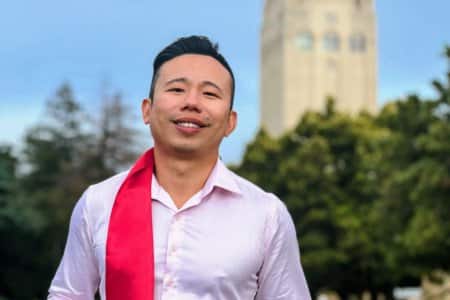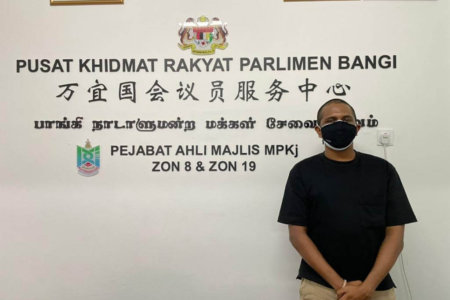
“What do you want to be when you grow up?”
It’s a question you may have encountered while in school but rarely know the answer. For Dr. Hannah Nazri, this question was a struggle.
“Honestly, I went through so many iterations of what I could be,” the University of Oxford graduate tells Study International.
“There was once I said I wanted to be an accountant because my dad was an accountant. I wanted to be a lecturer because my aunt was a lecturer. Finally, I settled on becoming a doctor.”
Little did the Malaysian know that she would be miles away from home to pursue a career in medicine — a journey that would see her completing a Master of Science (MSc) and Doctor of Philosophy (DPhil) at the University of Oxford.
Today, Nazri is an academic clinical fellow (funded by the National Institute for Health and Care Research) and a speciality trainee doctor in obstetrics and gynaecology at the University of Warwick.
Beyond this, she is passionate about women’s rights, youth, and education.
Most recently, Nazri attended the Women Deliver 2023 Conference in Kigali, Rwanda, to learn from experts and advocates of gender equity on driving the momentum in ending female genital mutilation/cutting (FGM/C) and upholding bodily autonomy.
Early life in Kuala Lumpur, Malaysia
Since young, Nazri was a bright student. After studying in Convent Bukit Nanas 2 for primary school, she secured a full scholarship to the nation’s top independent boarding school, Kolej Yayasan Saad, at 11 before completing her A Levels at Kolej Yayasan UEM.
“I was doing very well academically since I started primary school. When I was nine, I heard about Kolej Yayasan Saad and was handpicked by teachers to look into it,” she recalls.
Nazri’s teacher monitored her results for the next three years. At 11, she sat for a mathematics and English test. She was even selected to go for a week of assessments and an interview.
Asked whether the experience was nerve-racking for an 11-year-old, Nazri shared that she was too young to be nervous.
“I got a government boarding school offer as well to go to Sekolah Tun Fatimah, but I decided to go to Kolej Yayasan Saad because they had better facilities,” she says.
“My dad wasn’t really too keen because everyone thought I was really young, but I pushed for it as I felt that education was quite important.”
Still, that did not prevent the Malaysian student from experiencing a normal childhood. Her parents — an accountant and a biochemistry and pharmacology graduate — supported her every step of the way.
“When I was a lot younger, my mum was instrumental in teaching me a lot of science and mathematics,” she says.
“She taught a five-year-old algebra, so that’s what she’s like.”

In her journey to become a clinician and scientist, Nazri travelled and worked in different places and countries, including the Isle of Man, Kenya, and Nigeria. Source: Dr. Hannah Nazri
Moving to Bristol: The start of medical school
Nazri realised her passion for medicine at a young age — it started with a trip to the doctor.
“When I was around two or three, we went to the doctors to get our immunisation shot. I didn’t like it,” she shares.
“My father explained to me what germs are and how the vaccines actually worked and that sparked my interest.”
At 14, Nazri felt sick while in boarding school.
She was admitted to the hospital, specifically the accidents and emergencies department, where the doctors found that her platelets (tiny blood cells that help your body form clots to stop bleeding) were dangerously low.
As she recovered, Nazri started talking to more doctors and gained clarity on their career paths.
When it was time to decide what to pursue at uni, the Malaysian knew where she was headed: the University of Bristol.
For her undergraduate studies, she completed her MBChB Bachelor of Medicine & Surgery at the University of Bristol with a Bachelor of Science Medical Sciences with Medical Physics & Bioengineering from the University College London (a one-year intercalated degree).
“An intercalated degree is a common thing. It’s usually between your second or third year, which allows you to get a medical science degree with a specialisation of some sort,” Nazri shares.
“At that point, I thought that doing medical physics would be a great idea since I didn’t get to learn it due to the breadth of subjects I had in my first year.”

While studying at Bristol, Nazri was part of the Chinese Society and got the chance to try wushu and lion dance. Source: AFP
Overcoming the challenges of studying abroad in Bristol
While the Malaysian did well for her SPM (the local equivalent of GCSEs) — scoring 10 As and one B — she failed to qualify for any scholarships.
Still, Nazri’s father believed in her dream of becoming a doctor and withdrew a substantial sum from his pension to fund her studies at Kolej Yayasan UEM.
Currently, it costs 104,400 Malaysian ringgit (about US$23,000) to complete a 24-month A Levels programme at the college.
After finishing her A Levels, Nazri applied for a loan to pursue her medical degree at the University of Bristol.
Here’s the catch: She only learned about the loan approval three days before she decided to apply for her student visa.
“When I went to Bristol, I literally did not have much money because whatever loan I got came in at the very last minute,” she says.
“My parents also did not accompany me to the UK, so I had to find accommodation by myself. Luckily, I managed to settle in since I had great flatmates.”
The uni’s flexible financial arrangements allowed Nazri to pay for accommodation despite her unique financial issues.
The best part? The budding doctor had a great time in Bristol.
“I joined a few societies. I was part of the Chinese Society [and] did a little bit of lion dance. I tried Wushu as well and horse riding,” she says.
“I also got involved with Projek Kalsom and was the founding president of the Bristol Student Commonwealth Society.”

Nazri enjoyed the well-structured MSc programme at the University of Oxford. Source: Dr. Hannah Nazri
Completing her postgraduate journey at the University of Oxford
During the fourth year of MBChB, Nazri had an obstetrics and gynaecology placement, which sparked her interest in the field.
Obstetrics and gynaecology is a branch of medicine that specialises in the care of women during pregnancy and childbirth.
For her elective study during the final year of MBChB, she worked as an Obstetrics and Gynaecology Intern at Coast Provincial General Hospital in Mombasa, Kenya.
Soon after, the Bristol medical student served as a Foundation Trainee Doctor with the Department of Health and Social Care at the Isle of Man — an experience she truly enjoyed.
Asked why she decided to pursue an MSc in Clinical Embryology at the University of Oxford, Nazri explained her decision to search for a suitable taught master’s programme.
“When I came out of medical school, I wanted to take my time to explore because medicine is a marathon — I was interested in research and reproductive medicine.”
Plus, Nazri loved spending her summer break with family as she believes that “family time is important — time you’ll never get back.”
While Nazri did go into the labs to conduct experiments, she still had support from faculty members.
What drew her to the University of Oxford was the MSc programme structure.
“You had three terms. The first term is all about basic science, taught lectures, and a bit of training in the lab. It gets more clinical in the second term — you have clinical lectures, a bit of experience in reproductive medicine labs, and sitting in one of the clinics with one or two clinicians. During the third term, there was research,” she says.
The Malaysian would go on to complete her MSc in Clinical Embryology and DPhil in Obstetrics and Gynaecology. She received two merit scholarships to explore her interests in reproductive sciences and research.

Nazri conducted a talk at the European Society for Human Reproduction and Embryology (ESHRE), the world’s largest reproductive medicine conference. Her abstract was pre-selected for the 2022 ESHRE Basic Science Award for Oral Presentation. Source: Dr. Hannah Nazri
Working with NHS England and pursuing research on endometriosis
Nazri also worked with the National Health Service (NHS) during her postgraduate studies.
“After my master’s, I worked for a year in core medical training — that was internal medicine. So I’ve worked with the National Health Service (NHS) before. During my PhD, I did some shifts in internal medicine,” she shares.
“I’ve always wanted to train in the best places. Plus, it seemed like there was a system within the NHS where you could do academic research and clinical work at the same time. In Malaysia, you don’t have that opportunity — it’s either clinical or academic work.”
Today, Nazri is a National Institute for Health and Care Research-funded academic clinical fellow and specialty trainee doctor in obstetrics and gynaecology.
She splits her time between working with the NHS and pursuing research in endometriosis at the University of Warwick.

Today, Nazri is an Academic Clinical Fellow (funded by the National Institute for Health and Care Research) and a Specialty Trainee Doctor in Obstetrics and Gynaecology at the University of Warwick. Source: Dr. Hannah Nazri
Embracing the seasons of life: The secret to balancing one’s career and passion
As a medical student at Bristol, the Malaysian was involved with Project Kalsom.
Throughout her 10-year run with the non-profit, she held multiple roles, including leading a team to register the Projek Kalsom Motivational Camp as a charity under Malaysia’s Ministry of Youth and Sports.
In 2021, she founded Malaysian Doctors for Women and Children, a group of Malaysian doctors passionate about the academic and scientific discourse of non-medical cultural practices that affect women and children, as well as health inequalities experienced by minority groups in Malaysia.
“Whilst it’s a good idea to have local grassroot non-profits advocating against female genital mutilation (FGM), it’s [also] a good idea for the medical professional to take responsibility, and look in and reflect on our own practices and learn a bit more about this practice,” Nazri shares.
Currently, they are focusing on issues related to FGM, the gender pain gap and menstrual health.
As Nazri reflects on her medical academic career and non-profit work, she shares: “Try as much as you can see [and] see what suits your life — your life has seasons and phases. I was involved in Kalsom for a long time and I knew that the season with Kalsom had come to an end.”
She adds: “Maybe in the future, who knows, I might want to do an MBA? Maybe I’m done with clinical work. I feel that it’s important to be flexible, because in this day and age, if you’re not happy with something, you can always try something else.”










